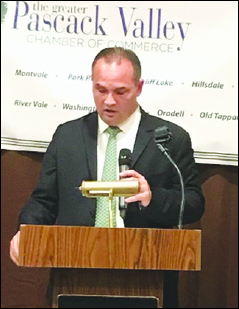
[slideshow_deploy id=’899′]
BY MICHAEL OLOHAN
OF PASCACK PRESS
Due to increasing deer-related motor vehicle accidents, resident complaints, the threat of Lyme disease, and deforestation of a local sanctuary, River Vale’s mayor told a Greater Pascack Valley Chamber of Commerce mayors’ forum Oct. 3 that the township was considering a deer hunt to control the burgeoning deer population and negative local impacts.
“It’s not finalized yet but that’s the direction we’re going,” River Vale Mayor Glen Jasionowski said.
At the 90-minute forum, Jasionowski joined six other Pascack Valley mayors in giving updates on important issues affecting their communities—including development, affordable housing obligations, marijuana legalization, flooding, road improvements and deer—before about 20 attendees at River Vale Country Club.
The biannual forum—another is conducted in January—also included mayors John Kramer of Old Tappan, Keith Misciagna of Park Ridge, John Birkner Jr. of Westwood, Michael Ghassali of Montvale, John Ruocco of Hillsdale, and Carlos Rendo of Woodcliff Lake.
Each mayor got six minutes to cover a list of topics suggested by chamber members, and much ground was covered, including newsworthy items such as the proposed deer hunt in River Vale.
Other mayors addressed the coyote/deer issues as part of wide-ranging—and occasionally rambling—presentations on a list of disparate topics that chamber members had requested mayors address.
Jasionowski said deer problems are “one of the biggest issues I face as mayor” and that residents regularly complain at council meetings. He said a couple local people have contracted Lyme disease and car accidents have gone from about two accidents on average per year to “in excess of 50 so far this year.”
“We have worked with the state and numerous experts and had them in to talk to mayor and the council, and we’re looked at every possible scenario and we as a township have made a decision that the only way to effectively do it is to have a hunt,” he said.
He added, “So the Township of River Vale will be working with the state to present to the town a solution that will have a hunt to cull the deer herd.”
Jasionowski said that as River Vale has three golf
courses, a possible “controlled setting” hunt could be conducted on the closed courses in concert with state authorities and expert bow hunters. He said sterilization was considered but experts told them it costs millions of dollars and deer from neighboring towns just come in when local deer are sterilized.
He also noted the local nature sanctuary “is almost ruined” due to deforestation from deer, which have no natural predators in the area. He said coyotes go after “easier prey” such as ground hogs.
Jasionowski said he initially never supported a hunt and fought it for years.
“When I looked at all the facts from all the experts I
couldn’t hide from it, I had to agree with the experts that’s the only way,” he added.
Many Bergen County towns have recently struggled with impacts from increasing numbers of deer.
Saddle River recently proposed plans for a controlled bow hunt and met with local opposition, while other towns such as Allendale have requested that Bergen County adopt a deer management plan that includes hunting on county lands.
Allendale officials contend that a local deer management plan is ineffective without a countywide strategy to control deer population. In many densely populated suburban areas, however, deer hunting is not an option.
Many communities have discussed deer management for years without taking any action. In Englewood earlier this year, local health officials conducted a survey which revealed increased number of deer in three of four wards citywide. No action was taken.
At Flat Rock Brook, a nature preserve in Englewood, an 8-foot fence was installed in 2016 to keep increasing number of deer from decimating the preserve’s vegetation and undergrowth. A hunt was considered but dropped because it was decided deer could leave the area during the hunt and return later, as well as community safety concerns.
Kramer said he saw “no quick answer” to the deer overpopulation problem. He said since Old Tappan has “a number of wooded areas” deer were not a major issue in town.
Misciagna joked that “we’ve done a study…all of our deer are coming from River Vale.”
Misciagna said people on both sides of the deer issue have “good points. But when it starts impacting the health of the community and accidents, something needs to be done.” He said deer are “beautiful creatures,” but with Lyme disease being spread “the situation is a serious thing.”
Ghassali said he is “absolutely” convinced of the deer issue and that only a “regional solution…the towns affected by this should be working together on this.”
Ruocco said he did not see a big coyote or deer problem there. He said wife has told him that they are eating hostas in their garden.
“I’ve noticed more and more of them. They’ve lost fear of man. They actually turn their heads before they cross the street now,” he noted. “Now they seem to be smarter, increasing their longevity which probably makes the situation worse.”
Ruocco said no residents have complained about the deer at council meetings and “right now it’s not a high priority on our list.”
Rendo noted “we have a deer problem and I think we still do” but that a bigger problem for the borough is coyotes “and everyone is pretty much spooked about that,” he added.
“We don’t have a plan for [coyotes] now,” said Rendo. “We don’t have the open areas for a hunt.”
Rendo said the problem with coyotes may be “a byproduct of overdevelopment.
“They go into our front yards and back yards and that will be an issue we will all be facing,” Rendo said.
